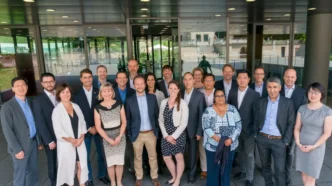Bosch Ventures is making waves again—this time across the Atlantic. The corporate venture capital arm of the Bosch Group has just launched a $270 million fund (about €250 million), focused squarely on deeptech startups in North America. The move could redefine not only Bosch’s global positioning but also raise critical questions about the state of innovation back home in Germany.
Bosch Ventures, known until recently as Robert Bosch Venture Capital GmbH (RBVC), isn’t new to global investing. Since 2007, it’s grown into one of Europe’s largest corporate VCs, managing more than $1.1 billion across a global footprint—from Silicon Valley and Boston to Frankfurt and Tel Aviv. With over 60 portfolio companies, including Germany’s Aleph Alpha, U.S.-based battery recycler Li Industries, China’s TrunkTech, and UK’s Quantum Motion, the firm is deeply embedded in deeptech ecosystems worldwide.
The latest fund—the sixth in its history—targets early-stage and scaling startups in artificial intelligence, climate tech, quantum computing, and automation. Bosch sees North America as a hotbed of generative AI, advanced manufacturing, and energy innovation—areas where it wants both insight and influence.
Ingo Ramesohl, Managing Director at Bosch Ventures, frames the strategy plainly: being present in leading ecosystems is essential to spotting breakthrough technologies that can reshape industries.
What Does This Mean for Germany?
Germany is no stranger to innovation. It leads in engineering, R&D, and patent filings. But scaling startups—especially in deeptech—has been its Achilles’ heel. Late-stage venture capital is scarce, and regulatory complexity adds friction for fast-growing startups.
Bosch’s approach could help close that gap. By investing abroad and bringing those learnings home, the company hopes to inject global best practices into Germany’s startup culture. It’s also pulling in international co-investors who might have overlooked the German ecosystem before.
At the same time, Bosch isn’t turning its back on its roots. Chairman Stefan Hartung emphasizes that startups can spark economic growth through disruption—and that Bosch intends to stay a strong global partner to the startup world, even during tough macroeconomic times.
Investing at Home, Not Just Abroad
Bosch is also doubling down on tech infrastructure in Germany. In 2022 alone, it invested over €400 million in semiconductor production facilities in Dresden and Reutlingen. Another €250 million is earmarked for clean-room expansions through 2025, aimed at strengthening Europe’s chip supply and supporting sectors like IoT and mobility.
These homegrown investments complement Bosch’s global venture work. It’s not about choosing one over the other—it’s about creating a flywheel of innovation that spins across borders.
Bosch’s Open Innovation Engine
Since 2018, the “Open Bosch” program has connected startups with Bosch’s industrial muscle. This co-innovation platform gives startups access to Bosch’s R&D labs, global supply chain, and engineering expertise. In return, Bosch gets early insight into cutting-edge technologies—fueling faster product development and stronger market positioning.
Programs like Open Bosch help bridge the cultural and operational gap between startups and legacy corporations. And they’re becoming crucial as Bosch evolves into a more agile, tech-forward enterprise.
The Innovation Dilemma: Reform or Risk Falling Behind
Despite its strengths, Germany faces headwinds. Overregulation, slow-moving policy, and rigid frameworks for equity and hiring continue to choke startup growth. Hartung has openly warned that unless bold reforms are implemented—especially around stock options, IPO readiness, and immigration—Germany could lose its competitive edge in critical areas like AI and clean tech.
He argues that future stimulus packages can’t just be feel-good headlines. They need staying power—reforms that not only attract but also retain talent, investment, and innovation.
A Blueprint for German Corporate VC?
Bosch Ventures may be doing more than writing checks. Its model could serve as a blueprint for other German industrial giants. By blending corporate scale with VC agility, it’s creating high-tech jobs and building innovation hubs beyond Berlin—in cities like Stuttgart, Dresden, and Aachen.
The fund also aligns neatly with national goals: supporting Germany’s Energiewende (energy transition), Industrie 4.0 (advanced manufacturing), and efforts to secure digital sovereignty.
If successful, Bosch Ventures could help Germany close its deeptech funding gap and modernize its policy environment. And that might just be the lever the country needs to reclaim its leadership role in global tech innovation.













